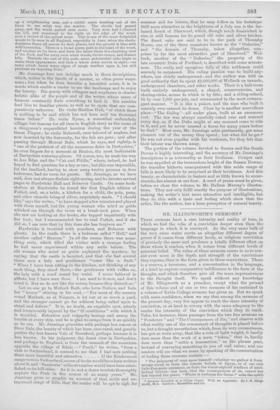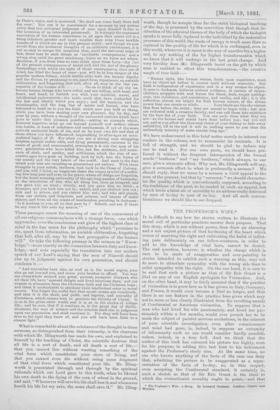MR. ILLINGWORTH'S SERMONS.* Mass sermons have a rare intensity and
reality of tone, in which we find the echo of a .conviction deeper even than the language in which it is conveyed. As the very same bulk of the very same water exerts an altogether different degree of power if it comes from different levels, so religious conviction of precisely the same sort produces a totally different effect on those whom it reaches, when it comes from different levels of personal belief. The value of these sermons seems to us to con- sist even more in the depth and strength of the convictions they express, than in the form given to those convictions. There is a reserve, a terseness, and a concentration in the language, of a kind to express comparative indifference to the form of the thought, and which therefore give all the more impressiveness. to the thought itself. We speak without any knowledge. of Mr. Illingworth as a preacher, except what the perusal of this volume and of one or two sermons of his contained in a volume of Keble College sermons has given us. But we speak with sonic confidence, when we say that among the sermons of the present day, very few appear to reach the same intensity of conviction, or at least to convey with the same adequacy to the reader the intensity of the conviction which they do reach. Take, for instance, these passages from the two fine sermons on " Penitence " and " The Consequences of Sin," and observe with what reality one of the commonest of thoughts is placed before us, but a thought nevertheless which, from its very commonness, has got so worn away, that like a coin of light weight, it hardly does more than the work of a mere "token," that is, hardly does more than " settle a transaction," as the phrase goes,. instead of conveying something to you of real value; and our readers will see what we mean by speaking of the concentration of feeling these sermons contain :—
" The judgment of man upon himself—whether we gather it from savage races, or from the remote beliefs of Egypt, or of our own Indo-European ancestors, or from the truest-gighted intellect of intel- lectual Greece—has Venn, that the consequences of sin cannot but, last beyond the grave. Where is Ardioaus the Great P' asks the spirit • &mina Preached in a Calhge Chapel. With an Appendix. By-J, M. Ming. worth, M.A. London : Macmillan and Co. in Plato's vision, and is answered, ' He shall not come forth from hell for over.' Nor can it be maintained for a moment by any serious critic that this universal judgment of man upon himself is duo to the invention of an interested priestcraft. It is simply the expressed conviction of the human conscience in all ages that moral evil is a thing infinitely greater and more terrible than even those terrible results of it which we see in this present world ; and though we now revolt from the moditeval thoughts of an arbitrary punishment, it is not so easy to escape the suspicion that, amid the universal reign of law, there may be such things as ' inevitable consequences,' and a -wrong step amid the great machinery, hurry us we know not where. Brethren, if you from timo to time think upon these facts--the fact of the present consequences of moral evil, and the fact of the gloomy forebodings with which the sight of those consequences, time out of mind, has filled the heart of man—you will be in less danger of the popular modern fallacy, which insults alike both the human dignity and the divine; by promising to sin, apart from repentance, an amiable .obliteration, and forgetting that hell, after all, may be the last pre- rogative of the human will Go on to think of all the un- `known human beings who have toiled, and are toiling, with head, and heart, and hand, to furnish you with your material, moral, and intellectual endowments— the noble souls that have contended for the law and liberty which you enjoy; and the martyrs, and the missionaries, and the long line of saints and heroes, who have laboured to hand on to you the faith which now you hold so cheap, -while you have been seeking your own pleasure, day by day, and year by year, without a thought of the uncounted sorrows which have gone to make that pleasure possible,—setting an example which, however negative, must go out beyond yourself and seduce others into habits, at least of indolence and carelessness, if not of the more actively antisocial kinds of sin, and so by your own life and that of +those whom you have influenced, bequeathing to after-ages an accu- mulated legacy of ill. For when you see a strong man struggling helpless against unfair odds, and dying prematurely, outworn in the cause of good, and unsuccessful, remember it is not the men of his own generation who have killed him, but the stubborn, dull resist- ance of sloth, and apathy, and selfishness, which the sins of suc- cessive ages have gone on bnilding, inch by inch, into the forms of our society and the very fabric of the world. And such is the fate which your sins are entailing on generations yet unborn. With these thoughts in your minds, brethren, look back to the Cross of Calvary, .and you will, I think, no longer see there the empty symbol of a suffer- ing now long past and over, in the grave, where all things are forgotten, but the inner meaning and reality of the age-long passion of humanity, in the crucifixion of him who all along hue been an hnngred, and you gave him no meat ; thirsty, and you gave him no drink ; a stranger, and you took him not in ; naked, and you clothed him not ; ick and in prison, and you visited him not ; and who still pleads, from our streets, and hospitals, and prisons, and haunts of sinful misery, and from all the coasts of heathendom perishing in darkness : ' Is it nothing to you, all ye that pass by ? Behold, and see if there
be any sorrow like unto my sorrow.' " •
These passages renew the meaning of one of the commonest of all our religious commonplaces with a strange force,—one which approaches even the conciseness and glow of the highest class of mind in the fine scorn for the philosophy which " promises to sin, apart from reformation, an amiable obliteration, forgetting -that hell, after all, may be the last prerogative of the human
will." Or take the following passage in the sermon on " Know- ledge,"—more exactly on the connection between duty and know- ledge,—and note especially the translation into our modern _speech of our Lord's saying that the men of Nineveh should rise up in judgment against his own generation, and should condemn it
" And remember here also, as well as in the moral region, your sins go out beyond you, and cause your brother to offend. You may 'see everywhere around you, great, patient, energetic thinkers, who all their life have ' scorned delight and lived laborious days,' and yet remain in alienation from the Christian faith and the Christian hope ; .and think it uncharitable to attribute their intellectual error to moral causes. You forget the awful fact that moral causes act vicariously, and that it is the sloth, and pride, and bigotry, and unreality of Christians, which causes men to question the divinity of Christ. It is so in the great outer world, and it is so in the circles of college life ; and be sure, that if it continue so, in the great day of disillu- sionment, the men of science and the atheists shall rise in judgment upon our generation, and shall condemn it. For they will have been true to the light they knew of, and you will have been false to a clearer light."
What is remarkable about the substance of the thought in these sermons, as distinguished from their intensity, is the clearness with which Mr. Illingworth has made his own, and explained to himself by the teaching of Christ, the scientific doctrine that all life is a sort of death, and all death a sort of life,- -that you cannot live without wasting something of the
vital force which constitutes your store of living, and that you cannot even die without using some fragment .of that vital force which constituted your life. Mr. Ming-
worth is penetrated through and through by the spiritual rationale which our Lord gave to this truth, when he likened his own death to the dying of the corn of wheat in the ground, aid. said, "Whosoever will save his life shall lose it, and whosoever loseth his life for my sake, the same shall save it." Mr. Ming-
worth, though he accepts thus far the strict biological teaching of the day, is possessed by the conviction that though that de- struction of the physical tissues of the body of which the biologist speaks is never fully replaced to the individual by the restorative
processes of this world, the waste of energy is much more than so replaced in the quality of life for which it is exchanged, even in
this world, whenever it is spent in the way of sacrifice for a higher end, to say nothing of the far higher transformation which we know that it will undergo in the last great change. And very forcibly does Mr. Illingworth insist on the gift by which man is enabled to effect this transformation,—the creative magic of true faith :—
" Human sight, like human reason, feeds upon experience, must have an object set before it, cannot work without materials. But faith is independent of experience, and in a way creates its object. It sees in darkness, believes without evidence, is certain of impos- sibilities, grapples with and forces the blank, dark, empty nothing- ness, into substance, and consistency, and reality, and life ; it is the reflection, almost too bright for frail human nature, of the divine power that can create as nihilo Your ideals are like the visions that float before the artist ; they are unreal to begin with ; but you are endowed with a creative faculty, and can call them into existence by the bare fiat of your faith. You can make them what they are not—as the heroes and saints have done before you ; but you will not, and so you allow the God-sent vision of your destiny to fade away unfulfilled, till in the end it will be nothing more to you than the melancholy memory of some sunrise long ago."
We have endeavoured in this brief notice merely to interest our readers in the volume, not to summarise its contents. It is full of strength, and we should be glad to induce any one to read it. For our own parts, we should have pre- ferred it without the frequent interspersion of the formal words " brethren " and "my brethren," which always, to our ears, give a sermonic effect. Why not, Mr. Illingworth will say,
give a sermonic effect to what is professedly a sermon ? We should reply, that we mean by a sermon a vivid appeal to the men of the present, but that by " sermonic " we should character- ise the quality which is conventionally supposed, according to the traditions of the past, to be needed in such an appeal, but which lends a faint air of unreality to an address really delivered
by men of to-day to men of to-day. And all such conven- tionalisms we should like to see dropped.



































 Previous page
Previous page